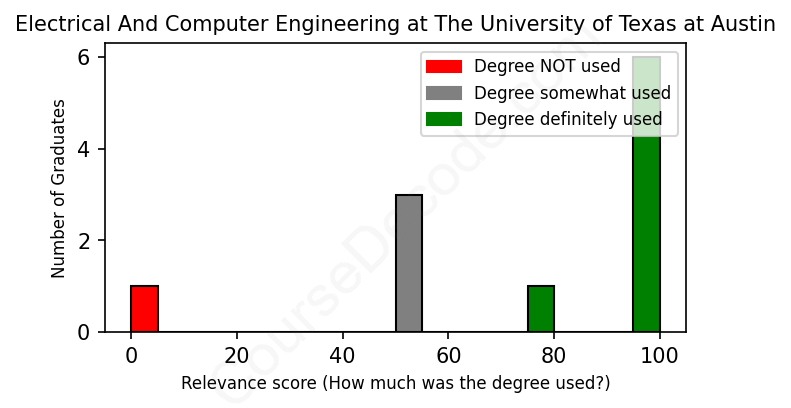
First, some facts. Of the Electrical And Computer Engineering graduates from The University of Texas at Austin we've analyzed , here's how many have used (or NOT used) their degree in their career:

These are estimates based on AI analysis of 11 LinkedIn profiles (see below).
The verdict? Above average. Overall, with an average relevance score of 75%, Electrical And Computer Engineering graduates from The University of Texas at Austin have a higher likelihood (+8%) of finding work in this field compared to the average graduate across all fields:
And for comparison, here's the chart for all profiles we've looked at across all degrees.
Also, after graduating, only 18% of these graduates have pursued further education other than another Bachelor's degree (such as a Masters degree or other), compared to the average across all profiles of 35%. This suggests a Bachelors degree is enough for most Electrical And Computer Engineering graduates, and it's normal to look for work straight after graduation.
See the details:
|
Relevance score: 52% We think this person has gone into a career only somewhat relevant to their degree. We think this person has gone into a career only somewhat relevant to their degree.
DEGREE INFOGraduated in 2018 from The University of Texas at Austin with a Bachelor of Science - BS in Electrical And Computer Engineering. Also pursued further education since (see below). JOB HISTORY SINCE GRADUATIONSoftware Developer Intern edgetensor Jun 2020 - Aug 2020 Qualitative Reasoning Group (QRG) Researcher  Northwestern University Sep 2020 - Present FURTHER DEGREES DONE SINCE GRADUATINGMaster's degreeGeorgia Institute of Technology 2018 - 2020 Doctor of Philosophy - ABD Northwestern University 2020 - 2025 ABOUTNo information provided. |
The top 10 most common jobs done by the graduates we've analyzed (ranked most common to least) are:
When looking at the career paths of graduates from The University of Texas at Austin with a degree in Electrical and Computer Engineering, it seems like a lot of them end up in software-related roles. Positions like Software Engineer are super common, and many of these roles do lean on the skills and knowledge they picked up during their studies. For example, engineering concepts are crucial for jobs at companies like NI, Khoros, and IBM, where the technical know-how really shines. However, not every job holds the same relevance. Some graduates drift into positions that may not utilize their engineering background as much, like restaurant management or entrepreneurship, which can feel a bit off the path one would expect for an engineering degree.
Overall, while several grads from UT Austin find jobs closely tied to their Electrical and Computer Engineering education, others venture into careers where their major's relevance is a bit shaky. It’s cool that their degrees provide a foundation that opens different doors, but if you’re aiming for a role that directly matches your engineering studies, positions like Software Engineer or Design Verification Engineer are definitely the way to go. There’s a clear connection for many, but the variance in job relevance shows that a degree in Electrical and Computer Engineering can lead to some unexpected career choices as well!
Here is a visual representation of the most common words in job titles for Electrical And Computer Engineering graduates (this is across all Electrical And Computer Engineering graduates we've analyzed, not just those who went to The University of Texas at Austin):

Graduates from the Electrical and Computer Engineering program at The University of Texas at Austin generally seem to find themselves on solid career paths after graduation. Most of them land their first jobs in roles like software engineering or process engineering, which are closely linked to their field of study. For example, recent graduates have started off as software engineers, cloud engineers, and even design verification engineers. This trend shows a clear alignment with their degrees, indicating that the education they received is being effectively translated into relevant industry roles.
As we look five to ten years down the line, many of these professionals continue to thrive in tech-related positions, often advancing in their careers. In fact, some have moved into management roles or started their own companies, while others remain deeply rooted in software engineering. There are also a few who have branched out to different fields, like management in restaurants, which is a bit unexpected for engineering grads but shows that the skills they gained can be applied in various ways. Overall, it looks like many of these graduates are doing well and finding meaningful jobs in areas that utilize their engineering expertise, which is pretty encouraging for anyone considering a similar path!
Getting a Bachelor’s degree in Electrical and Computer Engineering (ECE) at The University of Texas at Austin is definitely on the challenging side. The coursework is pretty rigorous, with a lot of tough classes in math, physics, and computer science that really push your limits. You’ll be doing a ton of problem-solving and hands-on projects, which can be both rewarding and stressful. It's not just memorizing facts; you need to understand concepts and apply them in real-world scenarios. So, if you’re thinking about it, just know you’ll have to put in a solid amount of effort, but it's also a great chance to learn a lot and grow your skills!
Most commonly, in the LinkedIn profiles we've looked at, it takes people 4 years to finish a Bachelor degree in Electrical And Computer Engineering.
From what I've seen with these Electrical and Computer Engineering grads from UT Austin, they seem to be doing pretty well overall! Most of them are landing solid engineering roles or managing positions at reputable companies, which usually means they're making decent money. For example, software engineers typically start off with competitive salaries, and roles in companies like IBM and Charles Schwab are likely to pay well too. Plus, the ones who launched their own businesses or took on roles at top tech firms could be earning even more. While we can't know their exact salaries without seeing some paycheck stubs, it definitely looks like they've landed on their feet financially!
Here is a visual representation of the most common words seen in the "about" section of LinkedIn profiles who have a Bachelor degree in Electrical And Computer Engineering (this is across all Electrical And Computer Engineering graduates we've analyzed, not just those who went to The University of Texas at Austin). This may or may not be useful:

Here are all colleges offering a Bachelor degree in Electrical And Computer Engineering (ordered by the average relevance score of their Electrical And Computer Engineering graduates, best to worst) where we have analyzed at least 10 of their graduates:
| College | Score | Count |
|---|---|---|
 Carnegie Mellon University Carnegie Mellon University
|
87 | 13 |
 The University of Texas at Austin The University of Texas at Austin
|
75 | 11 |
 The Ohio State University The Ohio State University
|
72 | 14 |